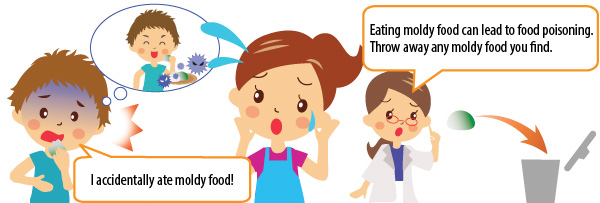Tokyo Food Safety Information Center » Tokyo Metropolitan Government food safety FAQ » I ate a manju bun three days ago that had mold on it, but I was told that molds are poisonous and now I’m worried. Will I be alright?
I ate a manju bun three days ago that had mold on it, but I was told that molds are poisonous and now I’m worried. Will I be alright?

I ate a manju bun three days ago that had mold on it, but I was told that molds are poisonous and now I’m worried. Will I be alright?
- I’ve heard that mycotoxins are carcinogenic; is this true?

If you are not currently ill then there is no need to worry that you will get ill from the mold in the future.
The taste and texture, however, of moldy food can change and become poorer, and it is recommended that you do not eat food if you notice it has mold on it.


There are many varieties of mold. The most common types of mold found on snacks and other foods include the black mold Cladosporium, the brown mold Wallemiomycetes, and the blue-green mold Penicillium. None of these create mycotoxins. Moldy foods, however, may have been stored in moldy conditions and in the temperature and humidity ranges under which molds grow, and it is recommended that you not eat such foods.
Aflatoxin is a well-known carcinogenic mycotoxin created by Aspergillus flavus, a mold which frequently grows in the tropics and subtropics. There is virtually zero chance of agricultural products in Japan being contaminated by this mold, however. Imported foods are inspected at quarantine stations. Inspections are conducted with particularly focus on regions in which contamination occurs frequently, and foods contaminated by mycotoxins are not permitted to be imported.
Aflatoxin is a well-known carcinogenic mycotoxin created by Aspergillus flavus, a mold which frequently grows in the tropics and subtropics. There is virtually zero chance of agricultural products in Japan being contaminated by this mold, however. Imported foods are inspected at quarantine stations. Inspections are conducted with particularly focus on regions in which contamination occurs frequently, and foods contaminated by mycotoxins are not permitted to be imported.